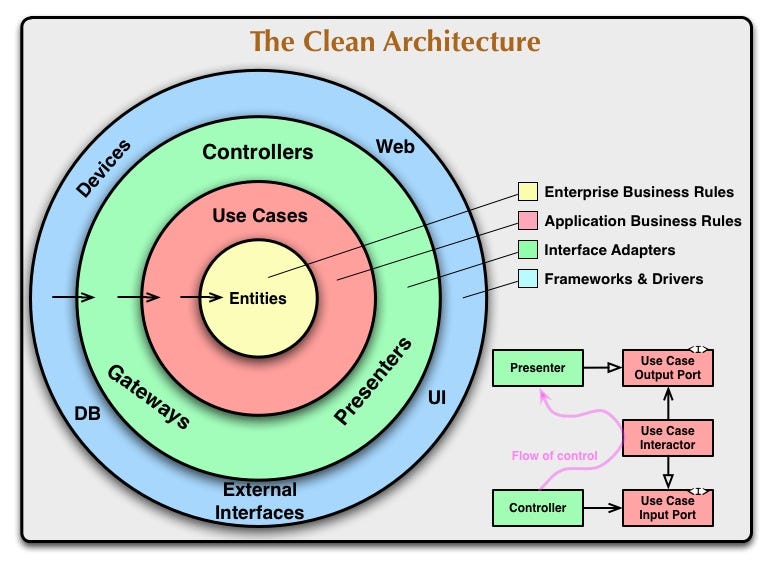Introducing Kotlin/Native
Kotlin for Android, iOS and beyond
by taylorcyang
table of content
- What is Kotlin/Native
- comparesion of Cross-Platform tech
- How it works
- How to use
- What's happening under the hood
1. What is Kotlin/Native
from KotlinConf 2018
K/N targets
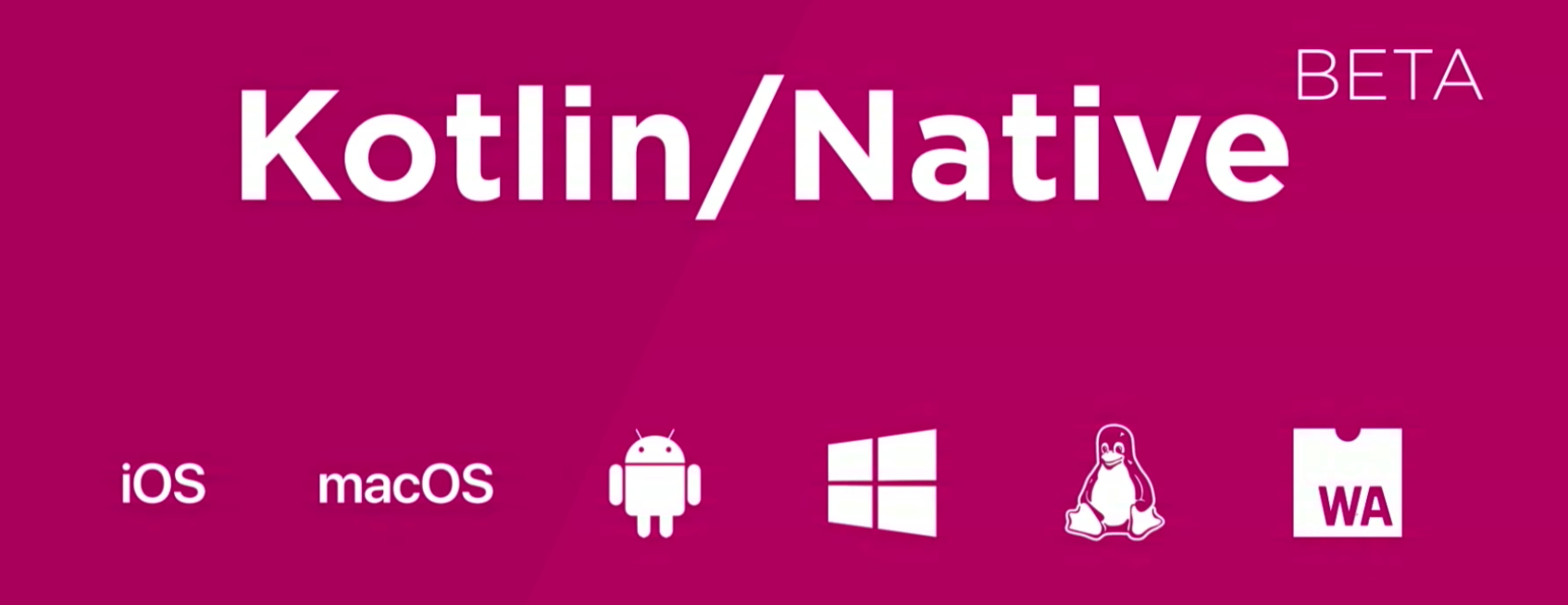
K/N targets whatever LLVM targets!
Answer
Kotlin/Native is:
- Kotlin compiles to native targets(without vm)
- A target of Kotlin lang.
- with all kotlin features
- K/N itself is not multiplatform
- K/N makes Kotlin multiplatform possible.
Who's using it
K/N is still in beta
- Kotlin-fullstack-sample
- Server & Frontend
- KotlinConf-app
- Android & iOS & Server
- DroidconKotlin
- Android & iOS (on AppStore!)
- Kotlin-mpp
- Android & iOS
multi-platform solutions
| Solution | Type |
|---|---|
|
Infrastructure |
|
Language + UI Binding |
| Language + Framework |
cpp
share cpp code with Android and iOS
Pros:
- High performance
- compat executable
Cons:
- Hard to learn/write
- Android: requeire JNI
- iOS: requires Objective-C++ bridge
- manual memory manangement
- all other CPP disadvantage
Wechat | Tencent Drive
J2ObjC
Translate Java code to OC
Pros:
- Java
Cons:
- ARC on Java (@Weak)
- large executable size (Java stdlib) 30+MB






Multi-OS Engine
Bundle an ART VM into iOS app
- Java
- Fully functional JVM
- GC
Cons:
- Extrimly large executable size(JVM and java stdlib) 80MB
PS: Xamarin is similar.
R/N & Weex & Xarmain
Language + Binding
Pros:
- JavaScript? (C#?)
- Front end community
Cons:
- Large executable size (V8)
- Performance
- Native UI knowledge
Flutter
Language + Framework
Pros:
- Dart VM
- MethodChannel
- UI performance
Cons:
- binary size & RAM consumption
- goes pure dart?
- platform API call
- how long can it survive?
to sum up
| soultion | cons |
|---|---|
| C++ J2Objc Multi-OS Engine |
1. none-unified coding style 2. large stdlib(VM) to bundle |
| R/N Weex Flutter | learn 3 platforms (2+1) |
How K/N works
- compiler
- runtime
- stdlib
- interop with C/Objective-C
Kotlin compiler
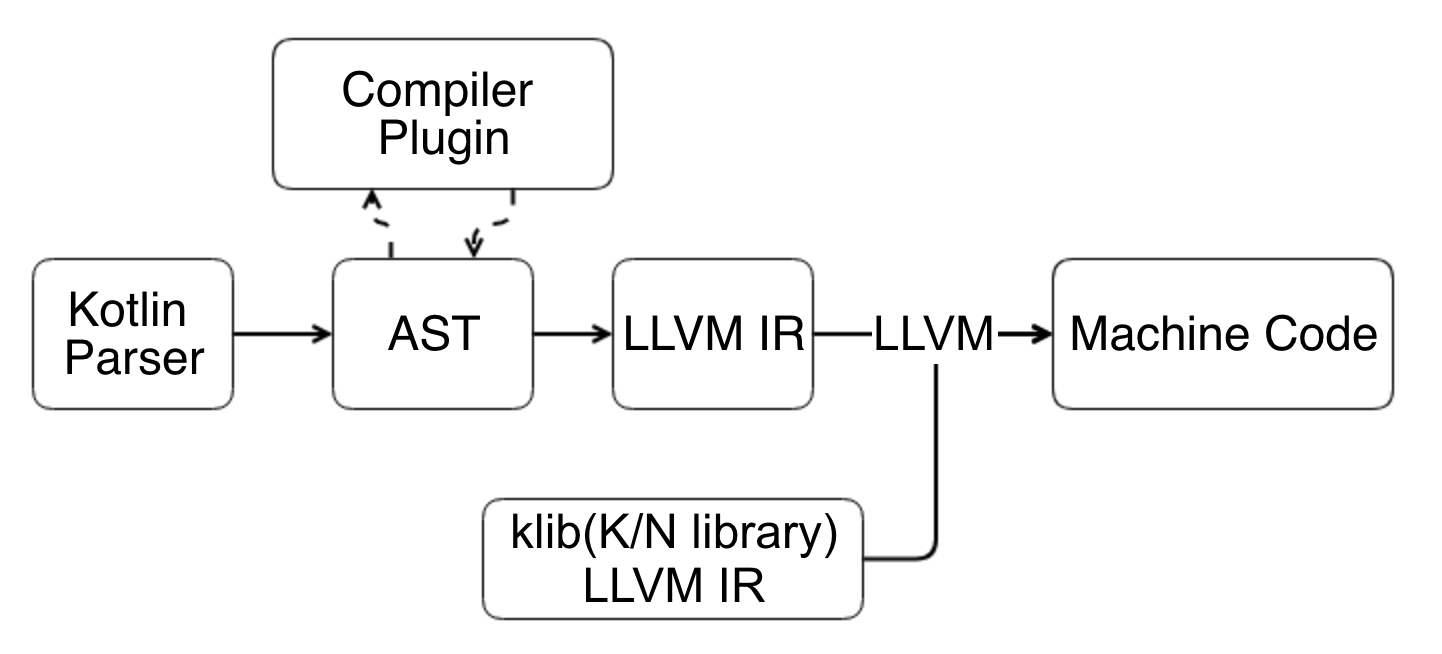
Kotlin/Native runtime
- memory management
- object memory layout
- concurrency model
- virtual method call
memory management
ARC with cycle collector
automated reference counter with a cycle collector to collect cyclical garbage.
 |
 |
 |
 |
|---|---|---|---|
| C/C++ | OC/Swift | Java | K/N |
| manual | half-auto | auto | auto |
concurrency model
- can't share mutable object across threads
freeze()marks an object tree inmmutable, thus sharing across threadsDetachedObjectGraphto transfer ownership to other thread, thus mutable.
Still under constructing...
coroutint isn't truly concurrent, yet
Kotlin stdlib and extension
- kotlin stdlib
- kotlinx.serialization
- json 2. protobuf 3. etc...
- extensible (jce)
- kotlinx.coroutines
- kotlinx.io
- kotlinx.atomicfu
- ktor
interop with Java
Kotlin on JVM platform
You know What is it.
interop with OC/Swift
-
K/N call OC methods
-
K/N extends OC class (and/or impl oc protocol)
-
passing K/N reference to OC
-
and vice versa
-
withiout performance penalty
K/N Swit interop -- method
kotlin
NSRunLoop.mainRunLoop().performBlock { block.run() }
swift
presenter = StoryContentPresenter(storyId: detailStory.id) presenter.onLoadData = { [unowned self] data in self.renderData(data) return KotlinUnit() }
OC
SharedCodeStoryContentPresenter *presenter = [[SharedCodeStoryContentPresenter: alloc] initWithStoryId: story.id]]
K/N Swift interop -- passing ref
// create a kotlin instance let block = LinkedList.Companion().createACallable() block(KotlinInt.init(value: 42)) // and use it
All kotlin class inherits KotlinBase which inherits NSObject
let list = LinkedList() // kotlin class list.put(e: Junk()) // Junk is swift class
OC class must inhert from
NSObjectto pass to kotlin
K/N Swift interop -- class
@ExportObjCClass class ViewController : UIViewController { @OverrideInit constructor(coder: NSCoder) : super(coder) @ObjCOutlet lateinit var button: UIButton @ObjCAction fun buttonPressed() { label.text = "Konan says: 'Hello, ${textField.text}!'" } }
swift extends Kotlin class
open class AKotlinClass { open fun helloWorld(greet: String) { ... } }
class SwiftClassInheritedFromKotlinClass : AKotlinClass { override func helloWorld(greet: String) { ... } }
K/N Swit interop -- import K/N to OC
-
K/N compiles to standard OC framework
-
import framework into OC/Swift
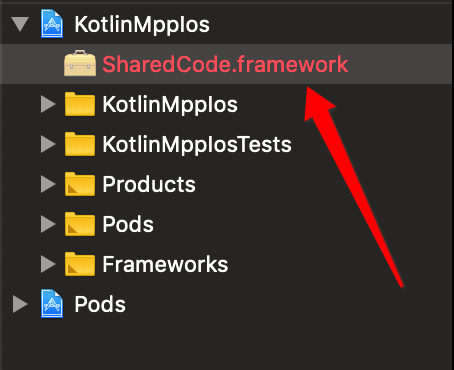
K/N Swit interop -- import OC to K/N
cinterop to the rescue
// UIKit.def depends = CFNetwork ... language = Objective-C package = platform.UIKit headers = UIKit/UIKit.h linkerOpts = -framework UIKit ...
cinterop create Kotlin binding for C and OC/Swift
K/N Swift interop -- iOS framework
K/N has already defined cinterop definition files
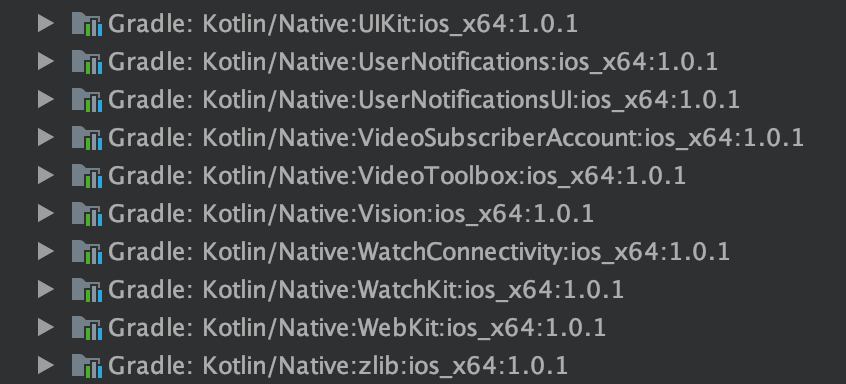
And you can write your own cinterop definition file, which is easy
How to use K/N
- quick look
- multiplatform project
- expect & actual
- clean architecture
Quick look
fun main() {
println("Hello Kotlin World!")
}
~: kotlinc kmain.kt ~: konanc kmain.kt -o kmain ~: ls -lh total 1680 -rw-r--r-- 1 young staff 687B Nov 26 10:54 KmainKt.class -rwxr-xr-x 1 young staff 829K Nov 26 10:52 kmain.kexe -rw-r--r-- 1 young staff 50B Nov 26 10:50 kmain.kt ~: java KmainKt Hello Kotlin World! ~: ./kmain.kexe Hello Kotlin World!
multiplatform project
.
├── SharedCode
│ └── src
│ ├── androidMain
│ ├── androidTest // unit test
│ ├── commonMain
│ ├── commonTest // unit test
│ ├── iOSMain
│ └── iOSTest // unit test
├── android
└── ios
project structure
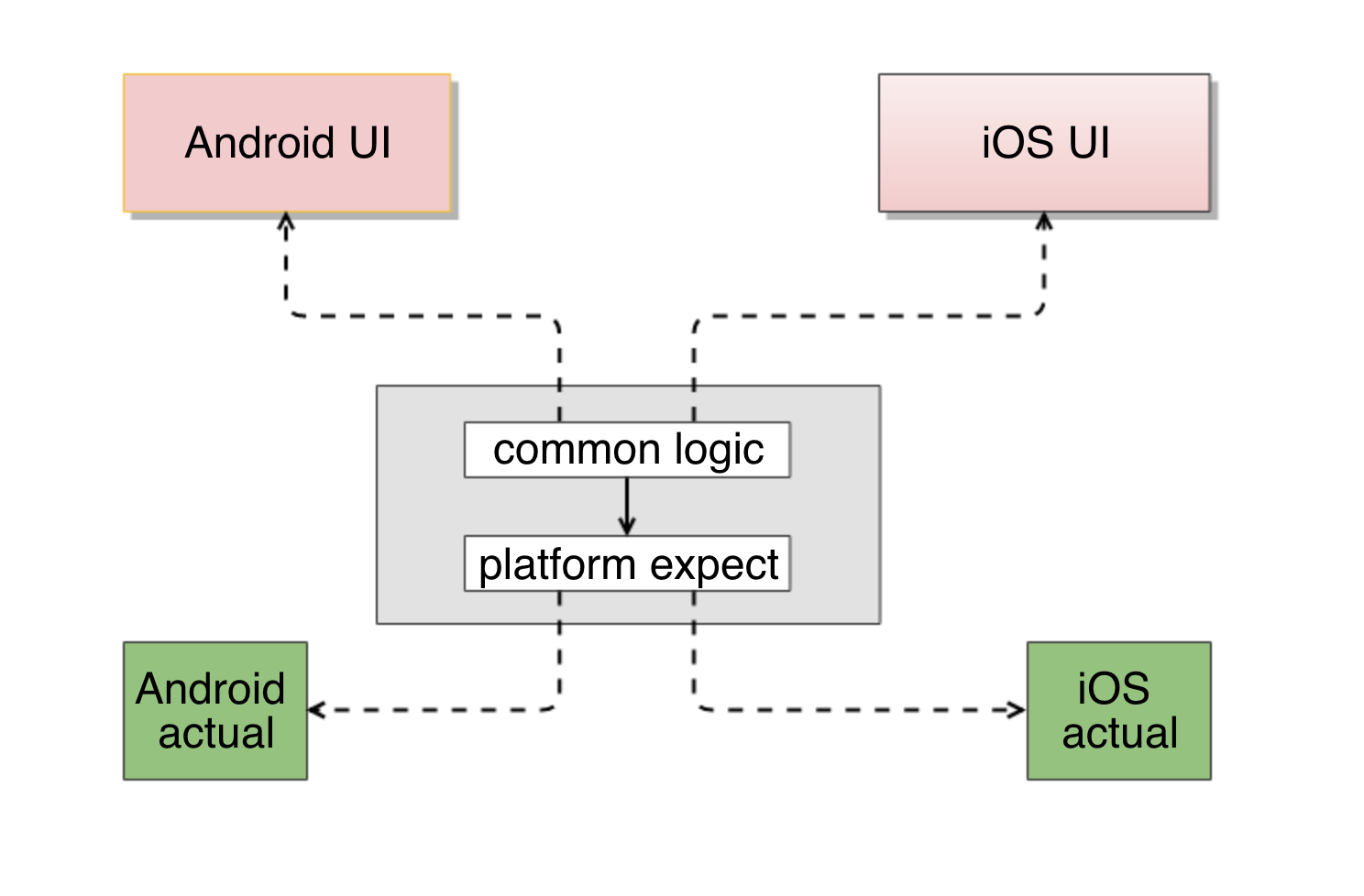
expect & actual

What do you expect? And what I have.
expect & actual
SharedCode
└── src
├── androidMain
│ └── actuals.kt
├── commonMain
│ └── expects.kt
└── iOSMain
└── actuals.kt
Seperate implementation and declaration
Similar to interface, but differs!
function expect-actual
commmon-exepcts
expect suspend fun httpGet(url: String): String
anriod-actual
actual suspend fun httpGet(url: String): String = withContext(MyDispatchers.Worker) { val httpConn = URL(url).openConnection() as HttpURLConnection httpConn.connect() httpConn.inputStream.readBytes().toString(Charsets.UTF_8) // ... }
ios-actual
actual suspend fun httpGet(url: String): String { val request = NSMutableURLRequest() request.setHTTPMethod("GET") request.setURL(NSURL(string = url)) // ... }
class expect-actual
commmon-exepcts
expect object MyDispatchers { val Main: CoroutineDispatcher }
anriod-actual
actual object MyDispatchers { actual val Main: CoroutineDispatcher = Dispatchers.Main }
ios-actual
actual object MyDispatchers { actual val Main: CoroutineDispatcher = object : CoroutineDispatcher() { override fun dispatch(context: CoroutineContext, block: Runnable) { NSRunLoop.mainRunLoop().performBlock { block.run() } } } }
expect-actual vs interface
- both need common decliration
- both need different implmentation
- expect-actual is static
- interface is dynamic
- expect-actual don't need depedency injection
Architecture
GOAL
- totally seperate UI and businiss logic
- UI goes native (platform api)
- businiss logic goes common (no platform api)
clean architecture
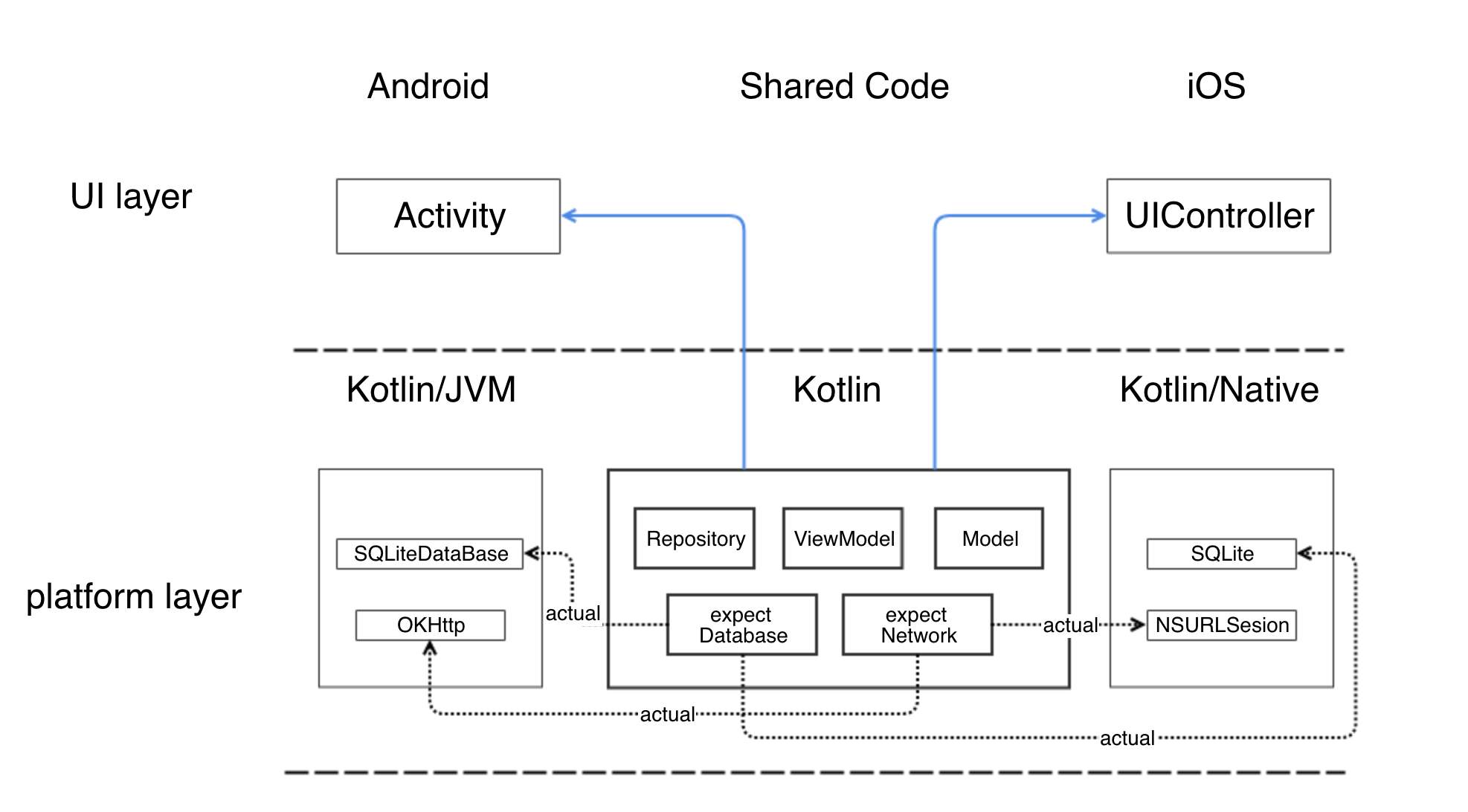
TO SUM UP Kotlin/Native
Pros:
- multi-platform
- full kotlin language feature
- easy interop wich OC/Swift/C
- compact runtime and stdlib
- enforce clean architecture
Cons:
- concurrency model is currently mistery
coroutine isn't cuncurrent for now (2018/11/29)
